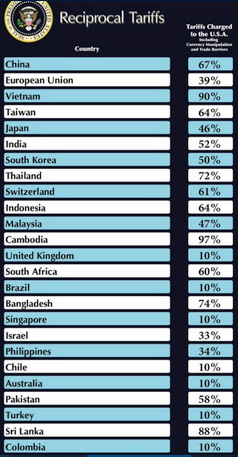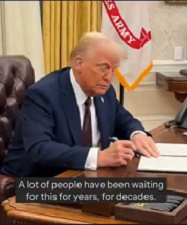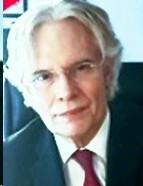| President Trump has explained his push for reciprocal tariffs, saying, "I’ve decided for purposes of fairness that I will charge a reciprocal tariff; whatever they tariff us, other countries, we will tariff them. That’s reciprocal back and forth.” In another public appearance, he added: "Whatever they tax us, we will tax them.” In addition, he signed executive orders in February and March instructing the Commerce Department to consider whether tariffs on imported copper, lumber, and timber were needed to protect national security. |
Lea este texto en español AQUÍ
The world is in a trade war, according to the left and the libertarian right. Furthermore, this odd couple tells us that this will be detrimental to American society. They add that it will lead to inflation. These arguments are deeply flawed. These premises presented against Donald J. Trump’s tariff implementations reflect static analysis, romanticized faulty interpretations, and political posturing.
Upon the conclusion of World War II, the U.S. began a course of subsidizing the economies of war-torn Europe and Asia. Supporting the importing of goods from these inflicted countries was viewed as a way to build strong democracies and stabilize the globe. Thus, a slow but sure path of wealth transfer began from the U.S. to these regions. An international division of labor was set up, and it seemed to go hand in hand with the idea that globalized capitalism would benefit everyone. Americans would get products cheaper, and West Europeans and Asians from Japan, South Korea, Taiwan, Hong Kong (then tied to the U.K.), and Singapore would build an industrial base.
 The evil of communism proliferated after the Second World War. The U.S., lacking the necessary foresight and believing that capitalism was a cure-all, decided to underwrite the transition of a centrally planned socialist economy to a market-compliant, politically controlled socialist economy in China. During the Third Plenary Session of the 11th Central Committee of the Chinese Communist Party in 1978, Deng Xiaoping defended Marxism-Leninism, evoked Karl Marx’s emphasis on “revolutionary practice,” and Lenin’s New Economic Policy, and launched the structure of "socialism with Chinese characteristics." The U.S. believed that what it perceived as having worked in Western Europe and non-communist Asia could be applied to Chinese communism, and democracy would spring up.
The evil of communism proliferated after the Second World War. The U.S., lacking the necessary foresight and believing that capitalism was a cure-all, decided to underwrite the transition of a centrally planned socialist economy to a market-compliant, politically controlled socialist economy in China. During the Third Plenary Session of the 11th Central Committee of the Chinese Communist Party in 1978, Deng Xiaoping defended Marxism-Leninism, evoked Karl Marx’s emphasis on “revolutionary practice,” and Lenin’s New Economic Policy, and launched the structure of "socialism with Chinese characteristics." The U.S. believed that what it perceived as having worked in Western Europe and non-communist Asia could be applied to Chinese communism, and democracy would spring up.
The opening to communist China did two things for sure. It irrefutably represented the biggest transference of capital and production witnessed in the modern world. China’s $1.1 trillion in total foreign investment stock in 2023 (per United Nations Conference on Trade and Development) is indicative of the West’s policy since 1978. The U.S. has been the main player, directly or indirectly. This has occurred at a great trade-off. American consumers have been given access to very cheap (and cheaply made) goods. Wall Street has profited enormously from lower production costs and higher sales. The losers have been the middle class, small businesses, non-college degree workers, and traditional cities, as well as rural settings.
Economics is not just about numbers. Models of socio-economy breed systems of ethics and anthropologically impact on social norms, culture, and societal behavior (among other things). Two of the West’s main problems are consumerism and radical secularism. If standards of living are measured by the ability of minimum wage earners to be able to buy an 80-inch television at Walmart while living in crowded housing, yet they cannot afford a home of their own, there has been a big decline. Living standards deserve better parameters. The increase in drug use in communities where major industries have left for other countries bears a causal relationship to the global division of labor economy.
The tariff policy being implemented by the Trump administration is part of a massive overhaul of the existing socio-economic order in the U.S. The goal is to transform the current crony, globalist capitalist model to a competitive, popular capitalism paradigm. This seeks to achieve the elevation of wages for the worker base. While this may come with a temporary lowering of consumerism, it will dignify the lives of many who have been left behind by this globalized system. Increasing American domestic production is vital to remaining free. The U.S. simply cannot depend on China for medical equipment, antibiotics, or crucial supply-chain goods; Taiwan for semiconductors; or Canada for steel. Bringing manufacturing back is not just about raising the lifestyles of the poor and middle class. It is a matter of national security.
Part of what many of the tariff critics argue is premised on lies. There has never really been free trade. The beneficiaries of the current system have had their government intervene in markets, manipulate currencies, and use their regulatory powers to keep American competition out. Another untruth is that the tariff war has just begun, and the U.S. is the instigator. If one considers placing tariffs as an aggression against another country that justifies a “retaliation,” then the U.S. has been the victim of a brutal war of tariffs against it for a long time.
India, an American ally, has a 75% tariff on U.S. autos and a 200% one on Kentucky bourbon. Japan, a close partner who has benefited enormously from the current system, places a 38.5% tariff on American beef. Some countries mask their tariffs by utilizing other regulatory instruments. South Korea, for example, has a flat 10% value-added tax on all imports; in addition, a special excise tax of 10-20% is levied on the importation of certain items. This seeks to avoid the word “tariffs,” which is a political lightning rod in some circles.
The overall trade deficit for 2024 was approximately $1.2 trillion, a historical record. The Trump tariffs are reciprocally tiered. Depending on the tariffs imposed on American producers, so will the U.S. tax foreign competitors. The idea of reciprocal tariffs is obtaining fair trade, something many forget was a cornerstone of Ronald Reagan’s trade principles. A collateral benefit of this policy is to serve as a magnet for foreign investors to come to the U.S. Approximately $1.4 trillion in foreign investments for 2025 has been announced. This is basically for an astonishing three-month period!
Punishing enemies, like China, for their involvement in the production of fentanyl, is another purpose of the tariffs. Getting supposedly friendly governments to take a more proactive part in combating drug and human trafficking, as well as illegal immigration, as is the case with Mexico and Canada, is served by tariffs. Here, it is used punitively to help correct policies or their lack of, which may be in contradiction to American interests.
There is another misconception about the impact of tariffs. Some believe, for example, that a 30% tariff on an item means that the consumer will automatically be hit with a 30% price increase. This is a static analysis that ignores real-world economic interplay. Many businesses that could be affected by tariffs would much rather take a decrease in profit than be priced out of the market. This is equivalent to many workers who must take a cut in pay to remain employable in certain industries or companies, considering the competition faced by the outsourcing of jobs.
The Trump tariffs mark the beginning of a challenging paradigm shift where capitalism can once again serve the lower and middle classes, instead of Wall Street and globalist projects. The U.S. and the West would be more secure with industrial production overwhelmingly made within American borders. This will go a long way in getting communist China, Iran, Russia, and North Korea out of Latin America and Africa. Mistakenly unrelated to some, tariffs and the strengthening of domestic production will weaken cultural socialism, which depends on globalism to advance. Seeing more people in churches and fewer in malls is a welcome sign. This new socio-economic model will yield dividends that materialism cannot measure.

Julio M. Shiling es politólogo, escritor, conferenciante, comentarista y director y columnista de los foros políticos y las publicaciones digitales, Patria de Martí y The CubanAmerican Voice.
Comments powered by CComment